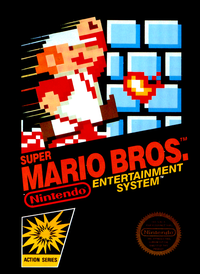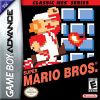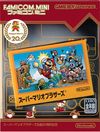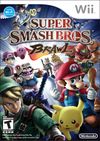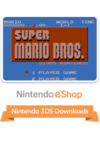| Site Notice |
|---|
|
We have a limited coverage policy. Please check our coverage page to see which articles are allowed. |
Super Mario Bros.
| This article is a short summary of Super Mario Bros.. Super Mario Wiki features a more in-depth article. |
| Super Mario Bros. | ||||||||||||||
| スーパーマリオブラザーズ Sūpā Mario Burazāzu | ||||||||||||||
| ||||||||||||||
| ||||||||||||||
| ||||||||||||||
| ||||||||||||||
|
Super Mario Bros. is a platformer video game originally released for the Nintendo Entertainment System in 1985. It was one of the seventeen initial launch titles for the system, as part of the Action Series of titles. Bundled with releases of the console, it is commonly cited as the biggest factor for saving the North American video game market after the market crash in 1983. Super Mario Bros. sold over 40 million units, making it the best-selling video game of all time for a single platform until the release of Wii Sports in 2006.
Contents
Blurb
Box
Do you have what it takes to save the Mushroom Princess?
You'll have to think fast and move even faster to complete this quest! The Mushroom Princess is being held captive by the evil Koopa tribe of turtles. It's up to you to rescue her from the clutches of the Koopa King before time runs out. But it won't be easy. To get to the Princess, you'll have to climb mountains, cross seas, avoid bottomless pits, fight off turtle soldiers and a host of black magic traps that only a Koopa King can devise. It's another non-stop adventure from the SUPER MARIO BROS.!
Story
One day, the king of the Koopas Bowser invades the peaceful Mushroom Kingdom and turns the inhabitants into stones, bricks and plants. The only one who is able to undo the black magic of the Koopas is Princess Toadstool, who was captured by Bowser and imprisons her in the last of his eight castles. The Mario Bros. hear about what happened and set out to free the princess, defeat Bowser and restore order to the Mushroom Kingdom.[1]
Gameplay
Super Mario Bros. is a 2D sidescrolling platform game, in which players play as Mario to traverse through levels by running or jumping. The object of each stage is to get to the flagpole at the end and clear the level. The game features eight worlds with four stages each, ending with a boss battle with a fake Bowser and Toad stating that the princess isn't in the castle. Throughout the game are blocks, which when hit give players items such as coins and power-ups, which allow Mario to grow in size and take more than one hit.
The game also features a rotational two-player mode in which the second player controls Luigi, competing with the first player to reach the end first and earn a higher score. When one player loses a life or completes a level, the second player can play from the stage they are on.
Technical details
|
Other releases
As one of Nintendo's most popular and well-known video games, Super Mario Bros. has been ported numerous times since its original release, and has been re-released the most times out of any Nintendo game.
| Title | Cover art | Platform | Release date(s) | Notes |
|---|---|---|---|---|
| Super Mario Bros. | Arcade (Nintendo PlayChoice-10) | 1985 | A direct port of Super Mario Bros. released for arcades.
| |
| Super Mario Bros. | Famicom Disk System | 1986 | A direct port of the game for the Famicom Disk System.
| |
| VS. Super Mario Bros. | Arcade (Nintendo VS. System) | 1986 | An alternate version of the game released for arcades. Slightly altered stages, and some completely different stages (some of which would be used for Super Mario Bros.: The Lost Levels.
| |
| All Night Nippon Super Mario Bros. | Famicom Disk System | 1986 | A retooled version of Super Mario Bros., using graphics from Super Mario Bros.: The Lost Levels and replacing various graphics with sprites based on elements and celebrities from the radio program All Night Nippon. This version of the game was distributed as a raffle prize on the program itself.
| |
| 2-in-1 Super Mario Bros. / Duck Hunt | NES | 1988 | A compilation cartridge containing both Super Mario Bros. and Duck Hunt, released with the NES Action Set bundle in 1988.
| |
| 3-in-1 Super Mario Bros./Duck Hunt/World Class Track Meet | NES | 1989 | A compilation cartridge released with the NES Power Set bundle, featuring Super Mario Bros., Duck Hunt, and World Class Track Meet.
| |
| Nintendo World Championships 1990 | NES | 1990 | A competition cartridge featuring a port of Super Mario Bros.
| |
| Super Mario All-Stars (+ Super Mario World) | SNES | Original: 1993 + SMW: |
A compilation of remakes of the first four Super Mario Bros. games (Super Mario All-Stars + Super Mario World featuring Super Mario World in addition), featuring updated graphics, sound, and programming.
| |
| Super Mario Bros. Deluxe | Game Boy Color | 1999 (NA/EU/AU) 2000 (JP) |
A Game Boy Color port of both Super Mario Bros. and Super Mario Bros.: The Lost Levels, including various additional features.
| |
| Classic NES Series: Super Mario Bros. Famicom Mini: Super Mario Bros. |
Game Boy Advance | 2004 | A direct port of Super Mario Bros., released as part of the Classic NES Series for the Game Boy Advance.
| |
| Super Mario Bros. | Wii (Virtual Console) | 2006 (NA/JP) 2007 (EU/AU) 2008 (KR) |
A direct port of the game, released as a digital download for Wii.
| |
| Super Smash Bros. Brawl | Wii | 2008 | A direct port of the game is included as a Masterpiece, as a 1:00 timed demo.
| |
| Super Mario All-Stars Limited Edition | Wii | 2010 | A direct port of Super Mario All-Stars for the SNES.
| |
| Super Mario Bros. 25th Anniversary Edition | Wii (Virtual Console) | 2010 | A direct port of the original game, though the original ? Block graphics are replaced with blocks featuring a "25" on them. Release exclusively with 25th anniversary red Wii bundles only in Japan.
| |
| Super Mario Bros. | Nintendo 3DS (Virtual Console) | Ambassadors: 2011 Full release: 2012 |
A direct port of the original game; originally released exclusively as part of the Nintendo 3DS Ambassador Program before being released to the public with Virtual Console features in 2012.
| |
| Super Mario Bros. | Wii U (Virtual Console) | 2013 | A direct port of the original game with added Virtual Console emulator features.
| |
| NES Remix 2 / NES Remix Pack | Wii U | 2014 | Titled "Super Luigi Bros.", a mirrored version of the original game with Luigi as the main character instead of Mario.
| |
| Ultimate NES Remix | Nintendo 3DS | 2014 | Titled "Super Speed Bros.", a sped-up version of the original game.
|
External links
References
- ↑ Super Mario Bros. instruction booklet, page 2
| ||||||
| ||||||
